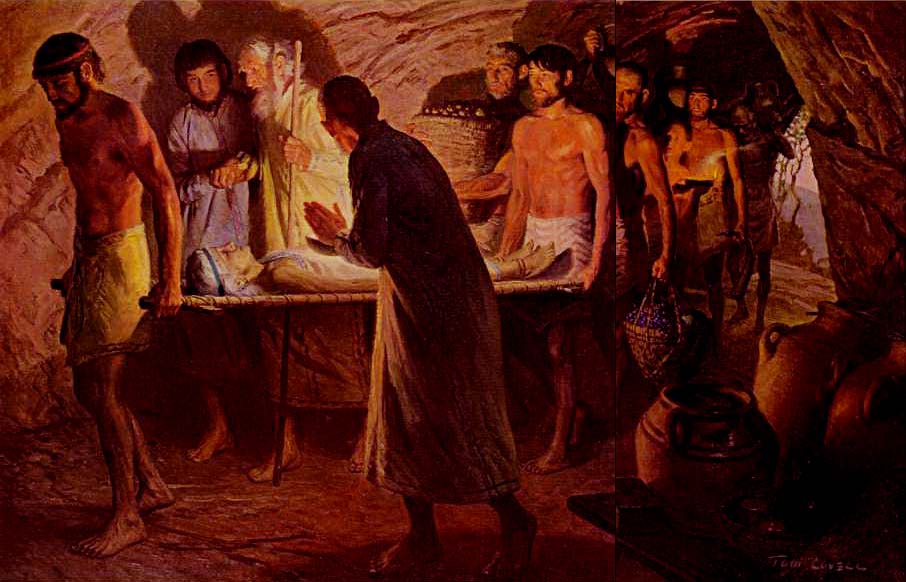The Burial of Sara
[23:1] Sara lived a hundred years, and twenty years, and seven years. The repetition of the word “years” was interpreted by the Midrash as alluding to special quality traits of Sara. However, the same formula is used regarding Avraham (25:7), and Ishmael (25:17). It would have probably been used for Yitzhak as well, but since he lived to a hundred and eighty (35:28), there are only two segments: a hundred years, and eighty years. When speaking of the life span of most people in Genesis, the Torah counts the ones separately but combines the tens and hundreds: Yaakov lived seven years, and hundred and forty years. It is interesting to note that biblical references to people’s life span are almost exclusively in the Torah, of which 98% are in Genesis, and Sara is the only woman whose age is specified.
[23:2] Sara died in Hebron and Avraham came to mourn her. The myth about Yitzhak being thirty-seven years old at the time of the Akedah has no textual proof, other than the juxtaposition of the stories about the Akedah, Rivka’s birth, and Sara’s death. It is illogical to assume that they occurred at the same time, since historical accounts are not a minute by minute coverage and only salient events are mentioned. This verse serves to repudiate the claim that Sara died immediately after, and maybe as a result of, the Akedah. Avraham departed from Be’er Sheva and returned to Be’er Sheva, and there is no indication that Sara did not live with him back then. In this verse, however, she dies in Hebron and he comes from another, unspecified place, to mourn her. He is clearly not a resident of Hebron, while she apparently is, because if she were not, we would find a discussion of her dying away from home, as was the case with Rahel. One can only speculate why Sara and Abraham lived in different cities.
[23:3] Avraham rose from in front of his dead and spoke to the Hittites. The narrative shifts from mentioning Sara by name to referring to her as “Avraham’s dead.” This term repeats seven times in the negotiation between Avraham and the Hittites, and only after the deal is completed, we read that Avraham buried his wife Sara (23:19). The shift is meant to signal Avraham’s transition from the emotional state of mourning to a practical mode of negotiating. His goal was to purchase burial site, as this would make him a permanent resident in the land, and he took advantage of the fact that he had a dead person to bury. The leverage he had did not stem from emotions but from a code of honor, which obligates one to take care of his dead. The possessive label shows that it was Avraham’s responsibility to arrange a proper burial for his relatives, and it would be disrespectful of the Hittites not to cooperate. Avraham knew very well that a burial site means ownership of the land, which the Hittites were not willing to relinquish, and he spoke to their code of honor. Only after he secured the deal, the Torah returns to speaking of Sara by name. Avraham says:
[23:4] I am a sojourner, a temporary resident among you, but I would like to purchase a burial stronghold to bury my dead. He states his intention to have אחוזת קבר – from the root אחז – to grasp or hold onto. The Hittites understand his intention but refuse to grant him the status of permanent resident. They cannot ignore the code of honor, however, so they offer a compromise.
[23:6] Listen to us! Sir, you are a chieftain of God among us, you can bury your dead in the choicest of our graves. The words “listen to us” are followed by the trope sign Pasek, which indicates full stop and separation. The verb שמע – hear, or understand, repeats six times in the story, signaling that there was no mutual understanding. The Hittites tell Avraham that he must stop and listen to them. He is highly regarded as a religious leader but not as a clan or a nation, he is a chieftain of God. They are willing to give him a gift, thus honoring his dead, without making him the full owner of the burial site. Avraham understands their intention and presses harder, not before bowing down:
[23:8-9] If you truly wish to bury my dead, who is lying in front of me, listen to me and plead with Ephron ben Zohar. Let him give me the cave of Machpela he owns, the one at the corner of his field, let him give it to me for the full price, as a burial stronghold for me in your midst. Avraham pulls no stops. He subtly casts doubt on their commitment to the code of honor. He makes all those present his delegates in pleading with Ephron. He specifies the name and exact location of the plot he would like to purchase, and he rejects the offer of a gift, saying that he will pay the full price. He also states that it will be his stronghold in their midst, making him a permanent resident.
Ephron, who was present in the meeting and could have been directly addressed by Avraham, tries to get out of the corner he was pushed into by saying [23:11]: No sir, listen to me! I have already given you the field, as well as the cave which is in it, I have done so in front of my people [you can now] bury your dead. Ephron strongly rejects Avraham’s offer. He says that the gift can be considered as already given, and it was done in front of the assembly, so it is official. He concludes by alluding that Avraham is stalling the burial to influence the Hittites and says that now nothing holds Avraham back from carrying out the burial.
Avraham retorts, again after bowing to the assembly [23:13]: If you would only listen to me, I have already given the money for the field. Take it from me and let me bury my dead. Avraham, the Hittites, and Ephron are struggling over the question whose voice will sound louder. Avraham insists: you say that you have already given the field? Well, I have already given the money! By telling Ephron to take the money, Avraham signals that he is the giver and Ephron the taker, and not the opposite as Ephron tried to argue.
Ephron, in a last and desperate attempt to thwart Avraham’s clever offensive, cites an exorbitant price [23:15]: Sir, listen to me. The land is worth four hundred silver coins, it is insignificant for both of us, bury your dead. Note that Ephron does not ask for a price. He rather states the value of the field and says that it should not be an obstacle for his relationships with Avraham. In that manner, he would be able to avoid criticism by his kinsmen, whom he fears will blame him for succumbing to Avraham. He can argue in his defense that he never invited Avraham officially to buy the field.
However, Avraham pays the full price, and the field becomes his. The Torah describes in detail the location and boundaries of the field, as befitting a legal transaction. The field is declared Avraham’s burial stronghold, and now that the deal is done, the term “Avraham’s dead” is gone, to be replaced by the more personal Sara, Avraham’s wife.
Thus, this twenty-verse long paragraph teaches us of Avraham’s struggles to gain permanence in Canaan. It is also a marvelous example of the complexity and subtlety of the biblical narrative.









Ohr HaChaim Yomi – Shemini